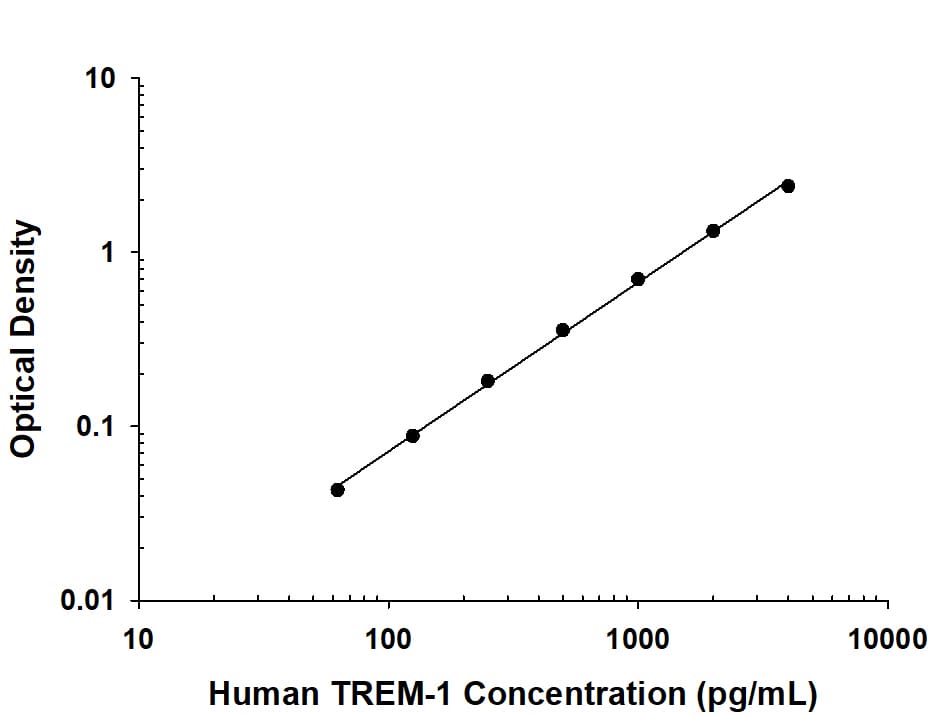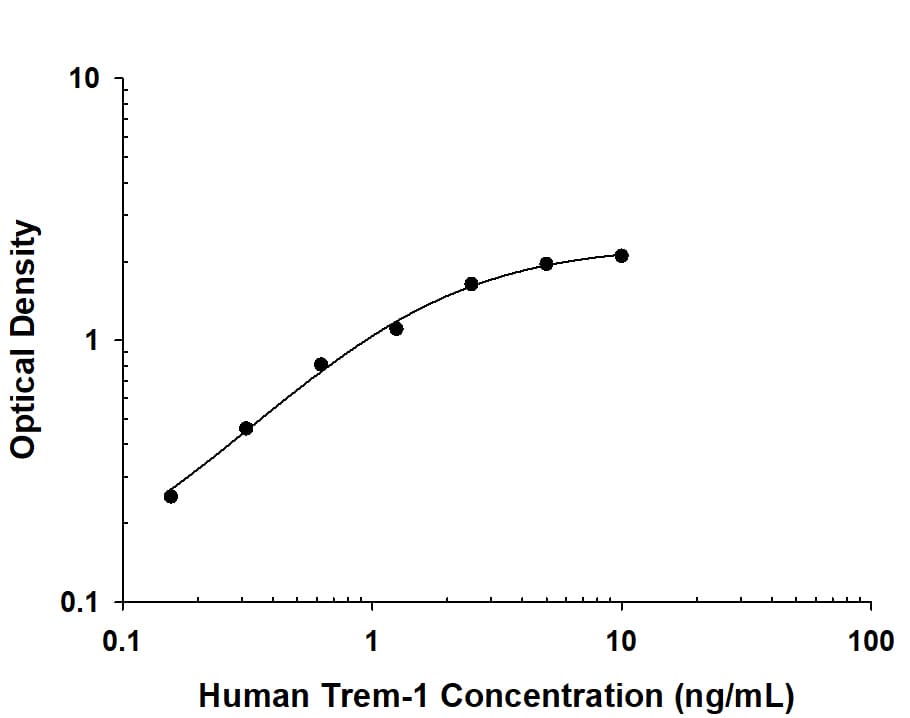Human TREM-1 Antibody
R&D Systems, part of Bio-Techne | Catalog # MAB12781


Key Product Details
Species Reactivity
Applications
Label
Antibody Source
Product Specifications
Immunogen
Ala21-Asn150
Accession # Q9NP99
Specificity
Clonality
Host
Isotype
Scientific Data Images for Human TREM-1 Antibody
Detection of TREM-1 in HEK293 Human Cell Line Transfected with Human TREM-1 and eGFP by Flow Cytometry.
HEK293 human embryonic kidney cell line transfected with (A) human TREM-1 or (B) irrelevant protein, and eGFP was stained with Mouse Anti-Human TREM-1 Monoclonal Antibody (Catalog # MAB12871) followed by APC-conjugated Anti-Mouse IgG Secondary Antibody (Catalog # F0102B). Quadrant markers were set based on control antibody staining (Catalog # MAB003). View our protocol for Staining Membrane-associated Proteins.Human TREM‑1 ELISA Standard Curve.
Recombinant Human TREM-1 protein was serially diluted 2-fold and captured by Mouse Anti-Human TREM-1 Monoclonal Antibody (Catalog # MAB12781) coated on a Clear Polystyrene Microplate (Catalog # DY990). Goat Anti-Human TREM-1 Antigen Affinity-purified Polyclonal Antibody (Catalog # AF1278) was biotinylated and incubated with the protein captured on the plate. Detection of the standard curve was achieved by incubating Streptavidin-HRP (Catalog # DY998) followed by Substrate Solution (Catalog # DY999) and stopping the enzymatic reaction with Stop Solution (Catalog # DY994).Human TREM‑1 ELISA Standard Curve.
Recombinant Human TREM-1 protein was serially diluted 2-fold and captured by Mouse Anti-Human TREM-1 Monoclonal Antibody (Catalog # MAB12781) coated on a Clear Polystyrene Microplate (Catalog # DY990). Mouse Anti-Human TREM-1 Monoclonal Antibody (Catalog # MAB12782) was biotinylated and incubated with the protein captured on the plate. Detection of the standard curve was achieved by incubating Streptavidin-HRP (Catalog # DY998) followed by Substrate Solution (Catalog # DY999) and stopping the enzymatic reaction with Stop Solution (Catalog # DY994).Applications for Human TREM-1 Antibody
CyTOF-ready
ELISA
This antibody functions as an ELISA capture antibody when paired with Goat Anti-Human TREM‑1 Antigen Affinity-purified Polyclonal Antibody (Catalog # AF1278) or Mouse Anti-Human TREM-1 Monoclonal Antibody (Catalog # MAB12782).
This product is intended for assay development on various assay platforms requiring antibody pairs. We recommend the Human TREM-1 DuoSet ELISA Kit (Catalog # DY1278B) for convenient development of a sandwich ELISA or the Human TREM-1 Quantikine ELISA Kit (Catalog # DTRM10C) for a complete optimized ELISA.
Flow Cytometry
Sample: HEK293 Human Cell Line Transfected with Human TREM-1 and eGFP
Formulation, Preparation, and Storage
Purification
Reconstitution
Formulation
Shipping
Stability & Storage
- 12 months from date of receipt, -20 to -70 °C as supplied.
- 1 month, 2 to 8 °C under sterile conditions after reconstitution.
- 6 months, -20 to -70 °C under sterile conditions after reconstitution.
Background: TREM-1
TREM-1 (Triggering Receptor Expressed on Myeloid cells) is a type I transmembrane protein having a single Ig-like domain. It associates with the adapter protein, DAP12, to deliver an activating signal. Several other TREM family members have been reported that are structurally similar but share less than 30% amino acid identity. TREM-1 is expressed on blood neutrophils and a subset of monocytes, and expression is up-regulated by bacterial LPS. The natural ligand for TREM-1 has not been identified. However, engagement of TREM-1 with an agonist monoclonal antibody leads to expression of IL-8, MCP-1, and TNF-alpha, suggesting that this receptor plays an important role in inflammatory responses. TREM-1 is expressed at high levels on neutrophils of patients with microbial sepsis and in mice with
LPS-induced shock. Blockade of TREM-1 with a TREM-1/Fc fusion protein protected mice against LPS-induced shock. Human and mouse TREM-1 share approximately 42% amino acid sequence homology (1-3).
References
- Bouchon, A. (2000) J. Immunol. 164:4991.
- Bouchon, A. (2001) Nature 410:1103.
- Nathan, C. and A. Ding (2001) Nature Med. 7:530.
Long Name
Alternate Names
Gene Symbol
UniProt
Additional TREM-1 Products
Product Documents for Human TREM-1 Antibody
Product Specific Notices for Human TREM-1 Antibody
For research use only

